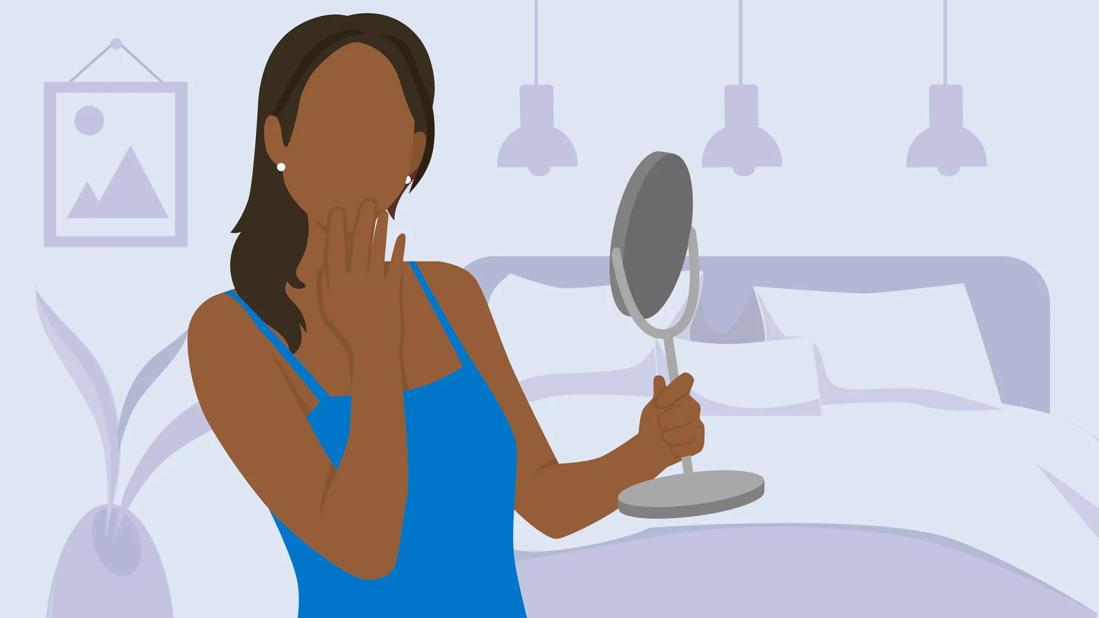It’s a continual process, but through meaningful practices, you can find peace and positivity with yourself

You open your phone and see someone’s perfectly fabulous beach vacation photo on your social media feed ... and you can’t remember the last time you looked so put-together.
Advertisement
Cleveland Clinic is a non-profit academic medical center. Advertising on our site helps support our mission. We do not endorse non-Cleveland Clinic products or services. Policy
Or another time, you find yourself reeling from an error you made at work, triggering that mean voice in your head that tells you that you’ll never be good enough.
As humans, our perception of ourselves can sometimes change in an instant. It’s no wonder it can be hard to maintain a positive self-image over time. This is often a result of a culture that trains us to continually want more, instead of simply being happy with ourselves.
“It’s not enough to be who we are. We constantly receive the message that we can always do or buy something to make us or our lives better,” reflects psychologist Susan Albers, PsyD.
But there are ways to build your self-image and find abundance with what you have and who you are. Dr. Albers explains why self-image is important, how it impacts other parts of ourselves and six ways to build a healthy self-image.
Self-image is the personal view, or mental picture, that we have of ourselves. It’s like a mirror in our head that reflects how we view ourselves, and it goes beyond just physical appearance.
You can also think of self-image as an “internal dictionary” that describes your characteristics, like intelligent, beautiful, ugly, talented, selfish or kind.
Advertisement
“These characteristics form a collective representation of our strengths and weaknesses as we see them,” says Dr. Albers.
Self-image is created over time. Dr. Albers points out that early childhood influences, such as parents and caregivers, have a major influence on our self-image.
From our early days of childhood, we continually take in information and evaluate ourselves in several areas, like:
Mainly, it’s our experiences and interactions with others that help form our opinions about ourselves. “Our experiences with others such as teachers, friends and family add to the image in the mirror,” explains Dr. Albers. “Relationships reinforce what we think and feel about ourselves.”
She adds that the image we see in the mirror may be a real or distorted view of who we really are. Based on this view, we develop either a positive or a negative self-image.
With a positive self-image, we recognize and own our assets and potential while being realistic about our liabilities and limitations. With a negative self-image, we focus on our perceived faults and weaknesses, distorting failure and imperfections.
In general, the key to a healthy self-image is self-acceptance. It’s impossible to have a positive self-image all the time — after all, we all have bad days and times when we are hard on ourselves. But if the negative days start to outweigh the positive, it can become unhealthy.
“You can have areas you want to work on, but you should have a basic, solid set of values and an ethical core and accept your humanness,” she notes.
In other words, it’s important to have a balanced view of your skills and attributes. This means accepting that there are things you aren’t good at and not letting that warp your self-worth. “Focus on valuing the part of you that is skillful, valuable and consistent with what you value,” she states.
Self-image is important because how we think about ourselves affects how we feel about ourselves — and how we interact with others and the world around us.
A healthy self-image can boost our physical, mental, social, emotional and spiritual well-being. On the other hand, an overwhelmingly negative self-image can decrease our satisfaction and ability to function in these areas.
Here are some ways that having a healthy, positive self-image can improve different areas of your life:
Advertisement
Advertisement
Self-image isn’t permanently fixed. Part of our self-image is dynamic and changing, so don’t beat yourself up if you find yourself slipping back into a negative mindset now and again.
The goal is not to have a “perfect” self-image. Rather, we should learn to develop a healthier and more accurate view of ourselves and challenge the distortions in the mirror.
Here are some steps to help you assess where you are currently with your self-image:
“Your self-image changes over your lifetime,” reiterates Dr. Albers. “A healthy self-image starts with learning to accept and love ourselves. It also means being accepted and loved by others.”
Here are some ways you can build a healthier self-image:
Oftentimes, a lot of the criticisms we have toward ourselves are learned. We’re born as an empty sponge that absorbs experiences, opinions and perceptions around us.
“Then other people and things, such as parents, teachers, clerics, peers or social media, made us feel like there was something wrong with us,” says Dr. Albers.
Advertisement
A good way to work against a negative self-image is to go back to those memories of when you were a kid, when you embraced your inner awesomeness before inevitable doubt crept in. How did you feel about yourself then?
Practicing gratitude is another way to fight against the unkind voice in your head that may be shaping your self-image. Try starting a gratitude journal — this will encourage you to lay out the good things you’re thankful for, whether they’re internal or external.
As you’re journaling, try to notice what you’re grateful for and what role you play in those things. “You’ll start to see your effectiveness in the world and in the lives of others. These actions contribute to a positive self-view,” reassures Dr. Albers.
Did you notice something good in another person? Praise it. The more you’re able to celebrate the wellness, success and positive experience of others, the more secure you’ll feel with yourself.
How? By shining a light of positivity on others around you, it often reflects back onto you. This practice of praising others can also help fight against a scarcity mindset or jealousy that can contribute to feelings of low self-worth.
Yes, we’ll continue to grow and change in our lives as time goes by. But if you’re dedicated, that growth can happen a lot faster and in a way that’s more powerful and robust.
At the same time, a big part of growth is being patient with yourself. For example, if you want to start a meditation practice, don’t expect that you’ll be able to sit for half an hour or more every day right from the start.
You might start with just one minute. After a few weeks, you might find yourself being able to sit for five minutes. With more practice, meditating for 10 or 20 minutes daily could be your new routine. It just takes time and commitment.
And this goes for any hobby or goal you take on. Any new activity that helps you personally grow can enhance your self-image. Maybe you want to learn a new musical instrument or plant a garden. Perhaps you want to make a consistent effort to reach out to people you haven’t talked to in a while. Create a plan, commit to it, schedule it and act on it.
While it’s a big part of our lives, social media can be a huge contributing factor to our self-image. That’s why it’s important to take breaks — even longstanding ones — from how much you engage in the digital world.
“One thing that’s injuring people these days is social comparisons from online images. Learning to eliminate our judging, evaluative minds helps with a good self-image,” advises Dr. Albers.
Depending on who you are and how much being online affects you, you may want to try setting a screen time limit on your phone, deleting certain apps that affect you negatively or taking a full vacation from social media to see how it impacts your self-image.
“On social media, people tend to portray themselves in their most favorable states and not their unfavorable ones. So, it can make us feel diminished in our humanness if we’re looking at it too much,” relays Dr. Albers. Instead, she recommends surrounding yourself with supportive people and cultivating relationships with people who appreciate and uplift you.
While everybody experiences unkind, unpleasant or negatively judging words, you may be more sensitive to them than others.
Here’s how to take note of your sensitivities. First, notice how you think about and describe yourself. Do you use mostly negative words? Notice which experiences, memories or people bring out those negative descriptions about yourself. When was the last time you felt your self-image was at its worst?
And when was the last time your self-image was at its best? Comparing these two sides can help you identify what are some of the root causes of your self-image issues.
Body image is a part of self-image. Our body image includes more than what we look like or how others see us; it also refers to how we think, feel and react to our own perceptions of our physical attributes.
Body image development is affected by cultural images and the influence of family, peers and society as a whole.
But body image isn’t fixed either. And like self-image, maintaining a positive body image is a lifelong process. But they can go hand-in-hand: Learning how to build a positive body image can help us maintain a positive self-image as well.
How we think about ourselves begins in childhood and evolves over time. If you find that you’re struggling with your self-image, the first step is to acknowledge that this is a challenge for you.
And if the suggestions here don’t help improve your self-image — or if your feelings about yourself have been consistently negative for some time — seeing a therapist can help you embrace more positivity.

Sign up for our Health Essentials emails for expert guidance on nutrition, fitness, sleep, skin care and more.
Learn more about our editorial process.
Advertisement

Focusing on non-physical attributes, practicing body positivity or neutrality, and avoiding comparisons can help

This pattern of self-doubt leads you to worry that someone will discover you’re a fraud and that you don’t deserve the success you’ve earned

Obsessively assessing your appearance? Cognitive behavioral therapy and journaling can help you figure out why you’re doing it — and how to stop

Horoscopes, fortunetellers and personality tests all feed into our cognitive biases and reinforce our own feelings as true

Ignore the negative self-talk, practice positive affirmations and remember, you’re not perfect — and that’s OK!

Foster communication about social media, encourage whole-person attributes and be mindful of your own negative self-talk

Filters and editing can lead to low self-esteem, depression and even body dysmorphic disorder

Wearing this undergarment for too long will do more harm than good

Even small moments of time outdoors can help reduce stress, boost mood and restore a sense of calm

A correct prescription helps your eyes see clearly — but as natural changes occur, you may need stronger or different eyeglasses

Both are medical emergencies, but they are very distinct events with different causes